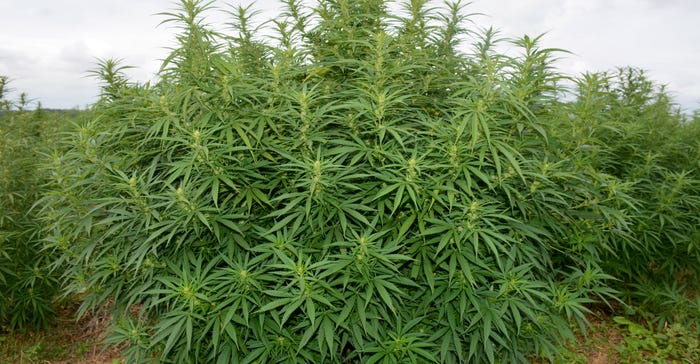
For the more than 300 registered hemp growers in Pennsylvania, along with hemp growers in other states, harvest will be here in just a matter of weeks.
At a recent hemp field day at Cedar Meadow Farm in Holtwood, Pa., panels of growers and industry experts talked about their plans for harvest and what growers should prepare for before cutting those plants and selling a crop.
Preparing for harvest
Mictch Shellenberger, co-owner of Shelmar Acres in Mount Joy, Pa., said he’s invested in an 8.5-foot whole plant harvester from Colorado-based Formation Ag. The harvester does 5 to 12 acres an hour and is available in sizes from 8 feet to 24 feet. It attaches to the front of existing 200-hp tractors.
Shellenberger said he likes the machine because it is designed to be gentle on the plant. It cuts the plants and then an adjoining conveyor places them into an adjoining wagon.
Joe Ullman of Cannabis Production Solutions said smaller-scale production is largely done by hand, especially if the plant is geared for high-end markets such as cannabidiol or smokable hemp.
Processors right now are paying up to $700 per pound, he said, so the plants must be in good condition when they’re harvested.
“You want to get it from the field into your drying area as quickly as possible,” he said. “You want to have good heat, airflow and constantly be checking the plant.”
Tobacco shears or even a bladed weed wacker will do the job on a small farm.
A good setup he illustrated involves harvesting 2-foot sections of the plants and hanging them in 16-inch rows in a barn, 24 inches apart for good airflow. The buds can’t fall on the soil because they are sticky and can pick up dirt and debris.
But harvesting like this takes a lot of labor. He said it took 250 manhours to cut, remove and hang a quarter-acre plot he was growing. Bottom-line, make sure a good specialty market is available before doing it by hand.
Drying the crop
Bron Irwin of Keystone Agriscience, a cooperative of about 75 growers in Lancaster County, Pa., and surrounding counties, will be using a commercial dehydrator bought from a company in Eugene, Ore. The cooperative members each contributed to buy the propane dehydrator, which can heat the air to between 105 and 118 degrees F.
Irwin said the goal is to get hemp to around 8% moisture to be considered dry. He plans on separating the flowers from the stalks at harvest and placing them in three-by-three trays. The trays will be placed in the mechanical dryer, which has the capacity to do 1,040 trays at a time.
Irwin said he hopes to do custom drying for other area growers but only after members of the cooperative get their plants dried first.
Andre Fry of Endo Scientific said he’s doing traditional hang drying this season, but he’s also interested in heaters and dehumidifiers.
Plants for high-end markets such as smokable hemp shouldn’t be exposed to lots of heat because they can lose flavoring that make them marketable.
Fry, who is originally from Lancaster County but grew hemp for several years in Colorado, said field drying is possible but only if the weather calls for dry, low-humidity days. Moisture can come out of the ground and get soaked up into the buds.
He said that smaller-scale growers can experiment by using a tarp and spreading the flowers out in a single layer to ensure the plants get enough sunlight.
Ullman said that between 85 and 90 degrees is the sweet spot for drying, but this can be a problem for large-scale growers since it takes more time.
He said the first 36 hours are critical to get the plants below 15% humidity. The best solution, he said, is to dry the plants in a dark place with modern temperature and humidity control, and plenty of airflow.
Field drying is another possibility. Fry, who grew hemp in Colorado, said he often field-dried his hemp.
Extracting the oils
Many growers in the area are trying their hand at hemp for CBD oils.
Ric Eshenwald of Hempfield Labs said his Pottstown, Pa.-based company will handle 100 acres this season for extracting oils for the CBD market.
He said his equipment uses ethanol extraction where they pre-process the plant before extracting the oils. One thing he hopes to announce later this year is his company’s technology to get tetrahydrocannabinol, or THC, out of “hot” plants, a big issue for hemp growers since THC, the psychoactive ingredient in marijuana, must be below 0.03% or must be discarded.
He said that the extraction process will convert THC into a different chemical.
Michael Morrow of 2Morrow’s Farm in Indiana talked about the potential of wet extraction as a possible option in future years.
He said the idea involves using a water-based solvent with supersonic pulses to pulverize the plant and then shake the oil into a water solution. The oil then goes into another process where it is turned into a crude-like oil for further processing.
Morrow said this is promising technology considering that hemp must be dried extensively before extracting the oils, but the technology has not yet been perfected.
About the Author(s)
You May Also Like






